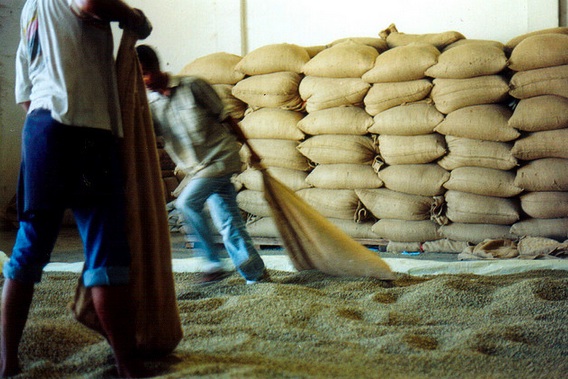In 2002, shortly after gaining independence from Indonesia after a bloody conflict that killed tens of thousands of civilians, The nation of East Timor outlined in its long-term National Development plan that its exported coffee must be organic.
In fact, in the ten years since, organic wet-milled coffees have largely represented the country’s production, with vast majority of the nation’s total exports going to Starbucks, which sells a seasonally available specialty blend known as Arabian Mocha Timor. This commitment to organic is in part because of the severity of the mountainous terrain in which most of the coffee grows, resulting in undeveloped cultivation and wild growth of plants past their prime. Al Jazeera news network recently profiled East Timor’s coffee industry, saying:
Because the trees got little attention the pesticide and fertiliser-free groves are now a goldfield for organic coffee lovers. Today, the coffee is known as the golden prince of East Timor agriculture — worth $10m a year, 46,000 coffee farms employ one-fifth of East Timor’s population.
Yet this may also be a curse, especially when the coffee brings back Starbucks-level prices. More from Al Jazeera:
They have some of the world’s oldest coffee trees growing in poor volcanic soils under skies that bring very unreliable rainfall. It is so bad, that a hectare of Timorese coffee plantation produces half of what the same plot in nearby Papua New Guinea can produce.
(More: Film on Hunger in Coffee-Growing Communities Wins Award)
This cycle of underdeveloped production and low returns on exports has perennially made East Timor’s hunger season one of the worst of any of the world’s coffee producing countries. Al Jazeera and Time recently published features on coffee hunger in the former Portugese colony, where the crop is the dominant non-oil export. The Time report goes into some of the production problems that are hurting Timor’s struggling coffee industry:
Alternative attempts to add value by processing beans domestically have had limited success. Processing machines have been supplied by the government so that coffee beans in their husks (known as “parchments”) can be sold instead of unprocessed berries, but this isn’t enough. “Parchments are sold to companies, who get most of the benefit,” explains Mariano Ferreira, agriculture spokesman for the La’o Hamutuk (Walking Together) government watchdog.
“A lot of the coffee goes to Starbucks and they get a rock bottom price here,” says Murphy. “Starbucks don’t even want you to peel the shell off the coffee, they want it fresh and so they can make all the money.”
These issues just scratch the surface in East Timor, and the stories of the country’s coffee struggles are not new. But as hunger season again sweeps through the tiny country’s smallholder farms, they are worth repeating. For more:
Read the Al Jazeera piece (with video)
Nick Brown
Nick Brown is the editor of Daily Coffee News by Roast Magazine.
Comment
1 Comment
Comments are closed.







“We’ve had a lot of hotels and resorts asking for the i – Hotels 360 flatscreen panel even though we’ve only installed a handful at a few national test sites,” adds Bart Wilson.
If this is a distraction you prefer, then pick up your clubs
and hit the Aloha State with all inclusive Hawaii vacations.
Other fun options on Oahu for children and adults, include Kualoa Ranch.